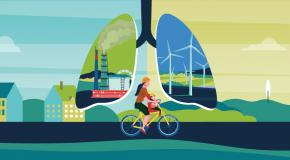Research on lung health often views the health of those affected by lung conditions through two narrow lenses, attributes of the illness and medical interventions available to treat or improve lung conditions. Whereas the physical, policy and socioeconomic context is a critical first step in understanding lung health. While some studies focus on the presence and effect of lung health inequalities, patient perspectives are often missing from these discussions. With this gap in mind, Economist Impact, supported by Chiesi Group, set out to better understand the realities and concerns of those living with lung conditions by capturing their experiences through a survey of 500 people in France, Germany, Italy, Spain, and the UK.
The aim of the survey and accompanying literature review was to explore a hypothesised relationship between lung health, air quality and health inequalities, focusing on the perspectives of people with lung conditions. By first exploring the policy landscape for improving air quality and then incorporating individual perspectives, this study takes a wider view to examine the impact of the environment within which people with lung conditions live.
The briefing paper below highlights the following key messages:
- Despite reductions in the concentration of key air pollutants, air quality negatively affects the symptoms, overall health and quality of life of people living with lung conditions.
- Overall the study countries have good air quality, but these data highlight the need to maintain and increase progress on reducing key pollutants. Policy makers should consider this on-going health impact and how to further incentivise action as they review national and international legal concentration limits and air quality guidelines.
- The increasing number of heatwaves and increased pollen load – both generally associated with climate change – are already having a large and negative impact on people living with lung conditions. There is a need for improvements in data collection to understand their extent and impact, enabling evidence-based policy making.
- Continuing climate change requires that policy makers integrate the impact of heatwaves and pollen into air quality policies that are inclusive of different perspectives, for example lung experts and environment experts working alongside each other, with people with lived experiences, etc.
- These issues were reported by survey respondents in all of the five study countries, but are especially acute in urban areas, highlighting that continued policy focus is needed on the specific impact of air quality on urban populations.
- Our research did not uncover any significant variation in the extent of these issues among those of different socio-economic status or education levels, possibly due to the broad protective effect of universal health coverage in the study countries. Despite this, policy makers should consider how heatwaves and increased pollen will likely affect those living with lung conditions when defining universal health packages and comprehensive respiratory health plans.
- Our research is a starting point, there remains a need for research that further explores the intersection of air quality, health inequalities and lung health, as well as understanding specific risks, vulnerabilities and adaptation strategies for people with lung conditions.





